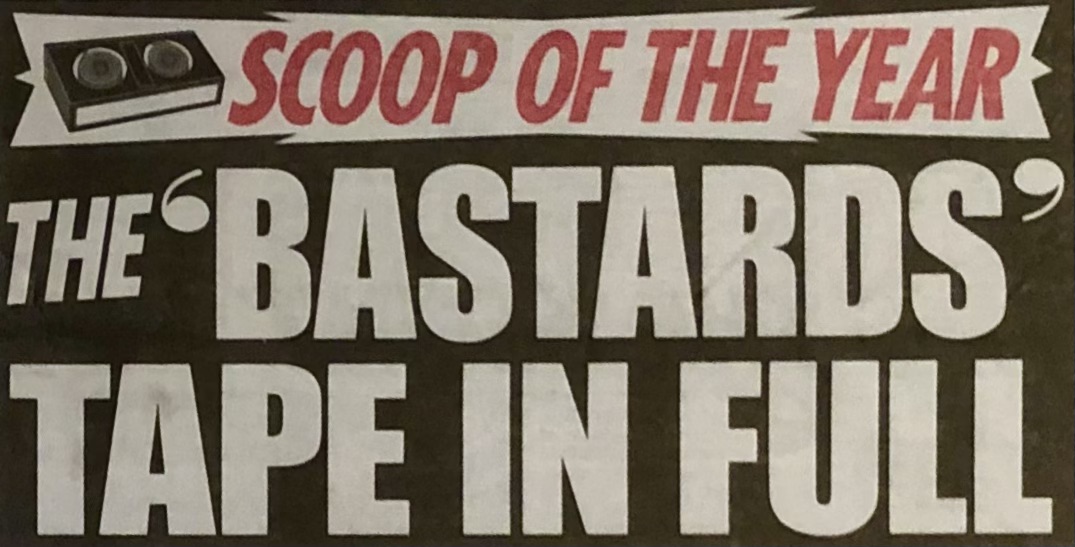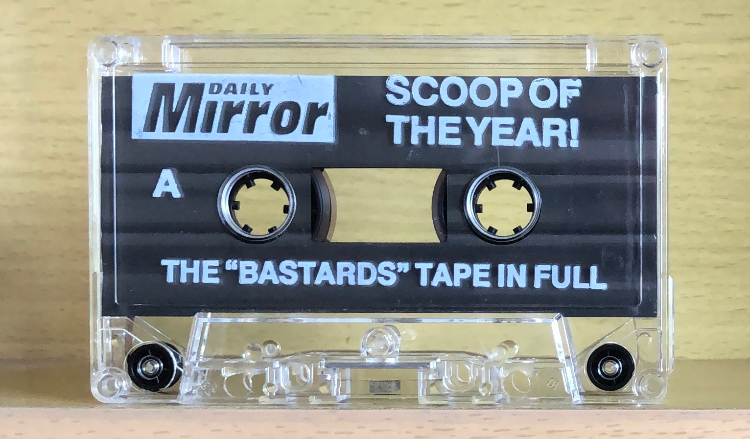
Next month marks the 30th anniversary of the ‘bastardgate’ scandal, when former UK prime minister John Major was recorded calling three of his cabinet ministers “bastards”. Major was speaking to ITN political editor Michael Brunson in an off-the-record conversation in Downing Street on 23rd July 1993, after they had taped a television interview. The exchange was not broadcast, but the cameras were still rolling.
Discussing current and former ministers who were briefing journalists against his policies on Europe, Major told Brunson: “You and I can both think of ex-ministers who are going around causing all sorts of trouble. Do we want three more of the bastards out there?” This was widely regarded as a reference to the Eurosceptic cabinet ministers Michael Portillo, Peter Lilley, and Michael Howard.
The Observer newspaper published lengthy quotes from the “remarkably frank” conversation two days after it was recorded. Two days after that, the Daily Mirror printed the entire transcript (headlined “THE ‘BASTARDS’ TAPE IN FULL”). The tabloid also gave away free bastardgate cassettes to readers who sent in coupons. (The tapes began with an introduction by then-editor David Banks, who said: “this tape signifies our stand against the establishment’s attempts to gag this great newspaper.”)
Discussing current and former ministers who were briefing journalists against his policies on Europe, Major told Brunson: “You and I can both think of ex-ministers who are going around causing all sorts of trouble. Do we want three more of the bastards out there?” This was widely regarded as a reference to the Eurosceptic cabinet ministers Michael Portillo, Peter Lilley, and Michael Howard.
The Observer newspaper published lengthy quotes from the “remarkably frank” conversation two days after it was recorded. Two days after that, the Daily Mirror printed the entire transcript (headlined “THE ‘BASTARDS’ TAPE IN FULL”). The tabloid also gave away free bastardgate cassettes to readers who sent in coupons. (The tapes began with an introduction by then-editor David Banks, who said: “this tape signifies our stand against the establishment’s attempts to gag this great newspaper.”)

Major devoted a chapter of his memoir to the controversy, admitting that he had been “careless... to have spoken to Brunson so freely”. At a lunch for Westminster journalists in 2013, he said that the “bastards” comment was “unforgivable”, then paused for effect and added: “My only excuse is that it was true.”
The Mirror’s bastardgate splash was followed a day later by the leaking of a different off-the-record conversation between Major and another journalist, Jonathan Dimbleby. This second recording was obtained by the Mirror’s tabloid rival The Sun, which dubbed it ‘Majorgate’. Speaking in 1992, Major could be heard using a racist idiom and complaining to Dimbleby that Conservative voters often refuse to take part in exit polls, which he described as “a high fuck-up factor among Tories.”
Bastardgate and Majorgate came shortly after two royal ‘-gate’ scandals, ‘Dianagate’ and ‘Camillagate’, which also involved illicitly recorded conversations. The ‘-gate’ suffix, most recently applied to ‘partygate’, originated with the Watergate scandal in the US.
The Mirror’s bastardgate splash was followed a day later by the leaking of a different off-the-record conversation between Major and another journalist, Jonathan Dimbleby. This second recording was obtained by the Mirror’s tabloid rival The Sun, which dubbed it ‘Majorgate’. Speaking in 1992, Major could be heard using a racist idiom and complaining to Dimbleby that Conservative voters often refuse to take part in exit polls, which he described as “a high fuck-up factor among Tories.”
Bastardgate and Majorgate came shortly after two royal ‘-gate’ scandals, ‘Dianagate’ and ‘Camillagate’, which also involved illicitly recorded conversations. The ‘-gate’ suffix, most recently applied to ‘partygate’, originated with the Watergate scandal in the US.
